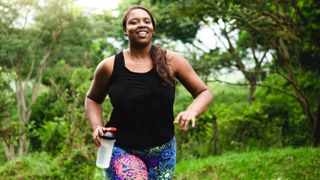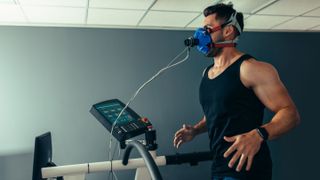What is cardiovascular endurance?
An exercise physiologist explains what cardiovascular endurance is and how to improve it

Many people know that cardiovascular endurance is an important aspect of being fit and healthy, yet it’s not always clear what exactly cardiovascular endurance entails. Should you be able to run a certain distance without stopping? Does it matter whether you use the best rowing machine or the best exercise bike?
To learn more about cardiovascular endurance, we spoke to Brynn Franklin, an ACSM-certified exercise physiologist.

Brynn Franklin is an ACSM-certified exercise physiologist and ACE-certified health coach, with an MS in Exercise Science. Her practical, day-to-day work focuses on improving women's health, but she also has a history of helping people master corrective exercises in their training.
What is cardiovascular endurance?
"Cardiovascular endurance is how well the body’s circulatory and respiratory systems can supply oxygen to the body during sustained physical activity," Franklin told Live Science.
The better a person's cardiovascular endurance, the longer they can sustain aerobic exercise without fatiguing or needing to slow down or stop.
Having good cardiovascular endurance not only means that a person can run further or swim more laps, but it also offers improvements for physical and mental health. Some of the other benefits include a stronger and more efficient heart function, improved breathing mechanics, lower resting heart rate and reduced risk of heart disease and stroke. Improving your cardiovascular endurance could also improve your ability to metabolize fat during exercise.
How to measure cardiovascular endurance
So, how do you know how 'good' your cardiovascular endurance is?
According to Franklin, "Cardiovascular endurance is measured by looking at the maximum uptake of oxygen (VO2 max) and how it’s used during intense exercise. In other words, the more oxygen you are using, and how effectively it is being used, tells us how well the cardiovascular and respiratory systems are working together."
Franklin said that from a practical perspective, cardiovascular endurance can be evaluated in a few different ways.

"For beginners, the Rockport Walk Test is a good way to measure cardiovascular endurance. The goal is to walk as fast as possible for one mile and then immediately take the pulse for 10 seconds," she said. "The heart rate is then input into an equation to find a person’s VO2 max."
In this way, the Rockport Walk Test is a good 'field test' that a person can perform on their own without going to an exercise testing laboratory or using specialized metabolic equipment.
Another viable field test that Franklin recommended to assess cardiovascular endurance is the YMCA 3-minute Step Test.
"The YMCA 3-minute Step Test can easily be administered by stepping up onto a 12-inch step while following a cadence of 96 beats per minute for three minutes," she said. "The pulse is taken immediately following the test for one minute. The pulse results are the score for the test."
While both of these tests can provide a reasonable estimate of a person's aerobic capacity, Franklin said the most accurate test for VO2 max is the Submaximal Treadmill Exercise Test, which has to be administered by a doctor or exercise physiologist in a laboratory setting.

"It involves a 20-minute test of varied intensity while the respiratory rate and heart rate are measured," Franklin told Live Science. "This test can be expensive and is used most often by elite athletes."
Franklin explained that a person can interpret their results by comparing them with the guidelines or results chart associated with the endurance test you performed.
How to improve cardiovascular endurance
Although beginners are likely eager to improve their stamina and cardiovascular endurance quickly, Franklin said that starting small is a viable way to go, if not more ideal. Overdoing it or doing too much too soon can result in injuries.
"Begin with 10-15 minutes of work for the first week," said Franklin. "Then, gradually work your way up by increasing distance, length of time, or incline by adding 10% to 20% each week."
In other words, incrementally ramp up the duration of a workout over time in a gradual, but progressive way. Of course, listen to your body as you go, backing off when you need more recovery.
Best types of exercise for cardiovascular endurance
Any type of exercise that a person can perform without stopping while getting your heart rate up into the aerobic zone can be used to increase cardiovascular endurance.
Generally speaking, the aerobic exercise zone is considered to be 70% to 80% of a person's maximum heart rate. For example, if your maximum heart rate is 180bpm, a cardio workout would ideally put your heart rate in the range of 126-144bpm.

Examples of good aerobic exercises include walking, running, hiking, swimming, cycling, rowing, stair-climbing, jump-roping, in-line skating, cross-country skiing and the elliptical machine. Franklin advised that the type of exercise you do isn’t as important as actually doing cardio exercises, so you’re best served choosing an activity you enjoy.
"If you don’t enjoy doing it, then you won’t continue and your cardiovascular endurance will suffer. Exercise should be fun and enjoyable," she said. "You can focus on one or cycle through different activities to keep things interesting and not mundane."
Sign up for the Live Science daily newsletter now
Get the world’s most fascinating discoveries delivered straight to your inbox.
Amber Sayer is a fitness, nutrition, and wellness writer and editor, and contributes to several fitness, health, and running websites and publications. She holds two masters degrees—one in exercise science and one in prosthetics and orthotics. As a certified personal trainer and running coach for 12 years, Amber enjoys staying active and helping others do so as well. In her free time, Amber likes running, cycling, cooking, spending time outside, and tackling any type of puzzle.

